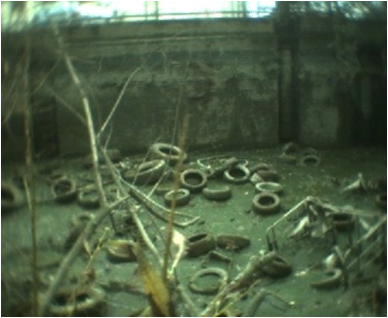29 November. Stratford, East London, is being reconfigured on a biblical scale, like a Martin doom. From the acres of mud and blue wrappings of the Olympic Park juts the city’s new monument, the ArcelorMittal Orbit, by the artists Anish Kapoor and Cecil Balmond, a vast sculpture of knotting girders like a snarled Gaian hernia. Its name is a corporate grandiosity on the part of its donor, the richest man in Britain. Near it is the stadium, its post-Olympic future a question mark, with bickerings and legal shenanigans ongoing. There’s Zaha Hadid’s aquatic centre, its celebrated lines ruined by temporary seating.

At the southern end of the development site, the walkway is on the path of an old sewer. Oh London, you drama queen. You didn’t have to do that. We watch from the route of effluent.
The Olympics are slated to cost taxpayers £9.3bn. In this time of ‘austerity’, youth clubs and libraries are expendable fripperies; this expenditure, though, is not negotiable. The uprisen young of London, participants in extraordinary riots that shook the country last summer, do the maths. ‘[B]ecause you want to host the Olympics, yeah,’ one participant told researchers, ‘so your country can look better and be there, we should suffer’.
Author Iain Sinclair has written this walk before. He’s an old hand at this scholarly, sceptical tour. He watches the city change shape from under an unlikely baseball cap, with polite dislike.
This is a city where buoyed-up audiences yell advice to young boxers in Bethnal Green’s York Hall, where tidal crowds of football fans commune in scabrous chants, where fans adopt local heroes to receive those Olympic cheers. It’s not sport that troubles those troubled by the city’s priorities.
Mike Marqusee, writer and activist, has been an East London local and a sports fan for decades. American by birth, he nonetheless not only understands and loves cricket, of all things, but even wrote a book about it. He’s excited to see the athletics when they arrive up the road from him in July. Still, he was, and remains, opposed to the coming of the Olympics. ‘For the reasons that’ve all been confirmed. These mega-events in general are bad for the communities where they take place, they do not provide long-term employment, they are very exploitative of the area in which they take place. The priorities become the development for the games.’
On the ‘Greenway’, Sinclair mourns the lost. The unplanned London. Allotments; scrub; pokey businesses and local houses. Stratford animals, with the edgeland in which they thrived. ‘I love that.’ He gestures at a construction sign, reads its claim sardonically. ‘“Improving the image of construction.” Improving the image of destruction.’
We’re shunted on a sight-seeing route, down pedestrian runnels. ‘You can’t go off-piste. Very much not.’
The paths, the enormous structures are neurotically planned and policed. For the area to be other than a charnel ground of Ozymandian skeletons in 30 years, it’ll have to develop like a living thing. That means beyond the planners’, beyond any, preparations.
The representative of the the Olympic Park Legacy Company laughs quietly down the phone at that. ‘Yes. You really hit the nail on the head. I’ll be honest, it’s a constant struggle. Not surprisingly, the planning decisions team who essentially are the arbiters of our planning applications wants comfort and certainty, then you’re kind of going, well, the future lies a long way out, and we need to be a little light on our feet. Is it easy? No, you’re right, planning is very constrained, and it’s a kind of blunt tool to do something where, you want places that are like those grittier, more diverse places’.
Her thoughtful honesty is refreshing. Mostly what we get in London is unending rah-rah from official channels. Two weeks after Sinclair’s morose sewage pilgrimage, at the London Policy Conference, a high-powered talking shop for urbanologists, politicians and academics in the brutalist concrete art zone of London’s South Bank Centre, Mayor Boris Johnson chortlingly describes those skeptical of the Games as ‘the gloomadon poppers!’ Johnson is crush-heckled: someone in the audience bleats that we all love him. The mayor is a ninja of bumptiousness, a man with a genius for working rooms full of the easily pleased. ‘The many gloomsters!’ he beams, still on Olympic theme.
The Games’ security plans grow ever more dystopian and surreal. There will be snipers in helicopters; jets; warships in the Thames; more troops on duty in London than in Afghanistan.
‘They won’t do it,’ Marqusee says, ‘but what would have been nice is if they’d made these the austerity games in a nice way. Just get rid of everything else, it’s not appropriate, it’s just going to be the sports, and we’ll enjoy it, everyone’ll go half-cost, no big hotels. [...] And you know, this is London!’ He says that with the pleasure of the Londoner by choice. ‘No, we’re not going to compete with Beijing, we’re not that kind of place anyway, we’re not an authoritarian state that can get 10,000 people to march up and down. But why not, you know, just who we are? Get some local kids out to do some hip hop or whatever.’
The Olympic Park recedes. Sinclair leads on toward the Stratford Station with its new soulectomied shopping centre Westfield. Past the Abbey Mills Pumping Station, built deliberately, in strange Victorian homage, to be ‘a cathedral of sewage’. At Abbey Creek, at last the coiffed zone ends. A scrubside cloacal sump, a quag of runoff reefed astonishingly with discarded tires and once-sunk supermarket trolleys, revealed by low tide.

Call it apocalypse tourism, but we stare at it a lot longer than we do at the twisted tower.
 Single page view
Single page view
